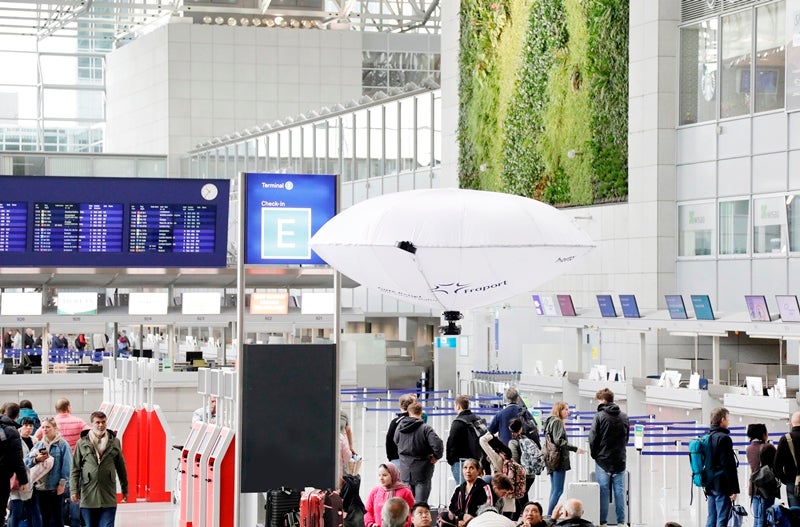
Gatwick Airport to trial different aircraft boarding sequences
London’s Gatwick Airport in the UK started a two-month trial to identify the most effective boarding sequence.
The airport installed large digital screens at Gate 101 for the trial. These screens show passengers the order of boarding.
The trial aims to identify the fastest and most relaxed method for decreasing large numbers of passengers rushing to gates.
Fraport and HAT trial hybrid aerial vehicle at Frankfurt Airport
German airport operator Fraport partnered with start-up Hybrid-Airplane Technologies (HAT) to trial a hybrid aerial vehicle at Frankfurt Airport.
The trial consisted of a small helium-filled hybrid aerial vehicle, H-Aero, which floated through Halls D and E at Terminal 2 for four days between 28 and 31 October.
The aerial vehicle is made of a helium-filled, lens-shaped balloon that helps it stay in the air. It has wings that can direct it in all directions.
How well do you really know your competitors?
Access the most comprehensive Company Profiles on the market, powered by GlobalData. Save hours of research. Gain competitive edge.

Thank you!
Your download email will arrive shortly
Not ready to buy yet? Download a free sample
We are confident about the unique quality of our Company Profiles. However, we want you to make the most beneficial decision for your business, so we offer a free sample that you can download by submitting the below form
By GlobalDataBerlin Schönefeld Airport reopens Pier 3A after renovation
German airport operator Flughafen Berlin Brandenburg reopened Pier 3A in Terminal A of Berlin Schönefeld Airport.
The two-storey building, which has a total floor space of 4,000m2, was closed for a complete renovation.
Departing and arriving passengers from the Schengen area can now access the open-plan waiting area and two food outlets on the ground floor of the facility.
New Orleans International Airport opens 35-gate North Terminal
Louis Armstrong New Orleans International Airport (MSY) in the US inaugurated its $1bn terminal to accommodate rising air traffic.
The 35-gate North Terminal was designed by Pelli Clarke Pelli and Manning Architects in partnership with Crescent City Aviation Team (CCAT), which is a joint venture of Leo A Daly and Atkins.
As well as leading the terminal design, CCAT designed the concession programme, three concourses and two parking garages.
Birmingham Airport to cut carbon emissions to net zero by 2033
The UK’s Birmingham Airport committed to reaching a net zero carbon emissions target by 2033, placing more focus on zero-carbon airport operations and reducing carbon offsets.
The airport claimed that it had already reduced carbon emissions by 33% since 2013, with passenger emissions reduced by 50% despite a 40% surge in numbers.
The Midlands airport stated that one of the methods to achieve this net zero carbon target is through onsite production of renewable energy.
Melbourne Airport finalises orientation of third runway
Australia’s Melbourne Airport decided to switch the alignment of its third runway from east-west to north-south.
The proposed new runway will now run parallel to the airport’s existing main runway.
In 2012, Melbourne Airport unveiled plans to build an east-west runway. However, in June this year, the plan was reversed after a report suggested that changing the direction to north-south could provide greater capacity.
Václav Havel Airport Prague unveils Terminal 2 expansion plans
Václav Havel Airport Prague in the Czech Republic unveiled a CZK16bn ($688m) Terminal 2 expansion plan to meet growing passenger traffic.
The country’s media outlet Prague Morning stated that around CZK9bn ($387m) will be invested towards the terminal. The remaining CZK7bn ($301m) will be used for constructing taxiways, a parking or elevated road and other traffic routes in front of the terminal.
Terminal 2 currently operates flights to and from the visa-free Schengen zone countries.
Adani receives CCI approval for stake acquisition in MIAL
Indian fair trade regulator CCI approved Adani Properties Private’s (APPL) purchase of a 23.5% stake in Mumbai International Airport (MIAL).
APPL will purchase the stake from Bid Services Division and ACSA, which have 13.5% and 10% interest in MIAL respectively.
CCI granted its approval under Section 31(1) of the Competition Act 2002.
North American airports trial WHILL’s autonomous personal EVs
Dallas / Fort Worth International Airport (DFW) in the US and Winnipeg Richardson International Airport (YWG) in Canada unveiled details from their trials of WHILL’s autonomous driving personal electric vehicles (EVs).
Semi and fully autonomous trials at DFW were conducted on 14 and 15 November. Semi-autonomous trials at YWG are scheduled to be carried out on 12 and 13 December.
The move aims to help passengers with reduced mobility to navigate the airport. The EV uses WHILL’s airport model and can return to its original docking station independently after taking passengers to their required airport destinations.
Chinese airlines and airports increase automation and AI investments
A report by IT firm SITA revealed that Chinese airlines and airports are adopting artificial intelligence (AI) and automation to offer a hyper-personalised self-service experience to their customers.
SITA 2019 China IT Insights revealed that AI is a key technology attracting investment.
The report stated that 88% of Chinese airlines and airports have plans for programmes or research involving AI by 2022 and are prioritising virtual agents and chatbots.







